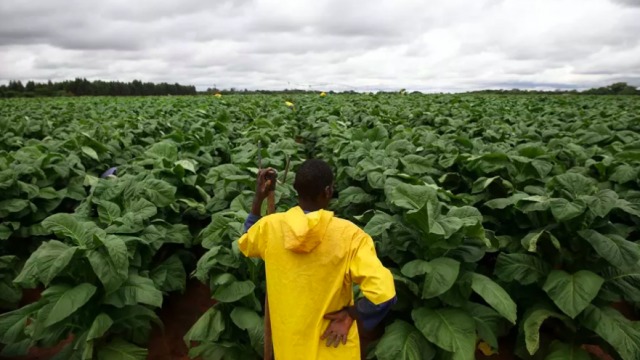- About
- Topics
- Picks
- Audio
- Story
- In-Depth
- Opinion
- News
- Donate
- Signup for our newsletterOur Editors' Best Picks.Send
Read, Debate: Engage.
| March 01, 2022 | |
|---|---|
| topic: | Human Rights |
| tags: | #Africa, #human rights, #Human Rights Watch, #child soldiers |
| located: | Zimbabwe, Burkina Faso, Burundi, Uganda, Mozambique, Ethiopia, South Africa, Swaziland, Egypt |
| by: | Cyril Zenda |
The 2022 Human Rights Watch (HRW) report reveals that human rights violations continued in the 26 African countries that the watchdog monitored last year, with the situation worsening in most of them.
The report noted that rights violations not only continued in countries facing armed conflicts, such as Cameron, the Central African Republic, Chad, Ethiopia, Mozambique, Nigeria and South Sudan, but were also recorded in countries like Angola, Burundi, Eswatini, Rwanda, Uganda and Zimbabwe, among others.
The report indicates that the human rights situation in Mozambique worsened in 2021, where an insurgency has been dragging for nearly five years in the northern gas-rich Cabo Delgado province.
This insurrection by an Islamist-linked armed group calling itself Ansar al-Sunna ('supporters of the tradition') has resulted in the displacement of nearly 800,000 people as of June last year, as the armed group continued to attack villages, kill civilians, kidnap women and children and use boys as soldiers in its fight against government forces.
"State security forces were implicated in human rights abuses, including intimidation, sexual exploitation of displaced women, and the unlawful use of force against civilians," the report reads.
A human rights researcher at a Mozambican civic society organisation told FairPlanet that while both sides have been committing human rights violations, some of the root causes of this insurgency itself can be traced to a history of human rights abuses by the Maputo administration.
"The situation is very bad and it is sadly getting worse," the researcher told FairPlanet on condition of anonymity. Journalists, researchers, human rights defenders, academics and even the clergy have been targeted for attack in Mozambique.
The report states that Rwanda’s human rights record remains atrocious, with the government of President Paul Kagame keeping the tiny African nation’s political and civic space tightly closed.
"The ruling Rwandan Patriotic Front (RPF) continued to stifle dissenting and critical voices and to target those perceived as a threat to the government and their family members," the report reads. "The space for political opposition, civil society, and media remained closed. Several high-profile critics, including opposition members and commentators using social media or YouTube to express themselves, went missing, were arrested or threatened."
The Kigali regime was also accused of pursuing critics and dissidents across the globe.
"Rwanda’s government and those operating on its behalf continued to exert pressure on Rwandan refugee and diaspora communities, as far afield as Australia and Canada. Refugees who are known critics of the government have been threatened and harassed."
Burundi, another African Great Lakes country, saw "limited" progress following the coming of a new leader President Évariste Ndayishimiye in June 2020, with a number of people - including journalists and human rights defenders - released from prison. There was, however, renewed assault on human rights by the government of the late Pierre Nkurunziza’s successor.
"Despite a lull in abuses against opposition members after the May 2020 elections, killings, disappearances, torture, arbitrary detention and harassment of those perceived to oppose the government continued throughout 2021," the report noted.
Africa’s absolute monarchy of Eswatini has been rocked by pro-democracy protests resulting in scores being killed and thousands arrested as the embattled King Mswati tries to maintain his absolutism, which his subjects see as outdated in this 21st century.
"There has been no progress on essential rights reforms, including the removal of all legislative and practical restrictions to free exercise of civil and political rights," the report noted.
It said these reforms would include the repealing or amendment of laws that obstruct the rights to freedoms and allowing for political parties, which would lead to democratic elections, among others.
Zimbabwe is another country that is on a downward trajectory with abductions, arbitrary arrests and mass evictions of citizens from their ancestral lands, among other violations, being noted.
"The administration of President Emmerson Mnangagwa failed to take meaningful steps to uphold human rights and ensure justice for serious abuses primarily committed by security forces in 2021," the reported pointed out.
It said there had been no accountability for abuses by security forces, including the August 2018 post-election violence, and killings and rape during the January 2019 protests.
"Abductions, torture, arbitrary arrests, and other abuses against opposition politicians and activists have not been meaningfully investigated."
Musa Kika, executive director of the Zimbabwe Human Rights NGO Forum, agreed with HRW's findings on human rights violations in the southern African nation.
"The Forum has, since 1998, monitored and documented human rights violations in Zimbabwe, and has stepped in to provide legal, medical and psychosocial support where needed," Kika told FairPlanet.
He said that with the recent UPR (Universal Periodic Review) process, for instance, the Forum coordinated with other Civil Society Organisations (CSOs) in the development of a CSOs shadow report, which formed one of the reports that UPR Working Group used as the basis for the review.
"This we do to ensure that the State’s perennial rosy picture it paints in its reports does no go untested. This is thus a measure we employ to ensure that the truth is laid bare," said Kika. "We do this with special mechanisms of the UN and AU (African Union) with the African Commission on Human and Peoples’ Rights, and the United Nations Human Rights Council itself."
"Locally, we have championed public interest and strategic impact litigation, engagement with the law and policy-making authorities, and defending of civic space to ensure that non-state actors and private citizens hold their government to account."
Usually considered a shining beacon of human rights, South Africa was accused of failing to take meaningful measures to improve protection of social and economic rights, which has been undermined by widespread unemployment, inequality, poverty, the government’s response to the Covid-19 pandemic, and corruption.
It was also found wanting in terms of protection of woman rights, environmental activists, LGBTQ+ communities and refugees and asylum seekers.
"The government’s Covid-19 aid programs, including food parcels during national lockdown, overlooked people with disabilities, refugees and asylum seekers, and many lesbian, gay, bisexual, and transgender (LGBT) people," the report pointed out.
It added that other human rights concerns include violence against women, failure to ensure justice and accountability for past xenophobic violence, and violence against environmental activists.
Piers Pigou, International Crisis Group’s senior Consultant for Southern Africa, said the problems that South Africa faces should be understood in the context of some "extraordinary challenges" that have their roots in the country’s complex history.
"In the context of South Africa, it should be noted that we are trying to build something that was not there before, so it would not be improper to talk of a decline as if a perfect situation existed before," Pigou told FairPlanet.
He added that the good thing about South Africa is that it has the framework of a strong constitution as well as strong democracy-supporting institutions - such as a solid judiciary branch, a vibrant civic society movement and the media - all of which are still able to interrogate issues and seek remedial action.
In Egypt, the continued reliance on the abusive Emergency State Security Courts saw an increase in human rights violations in 2021, as these courts were used to prosecute and persecute peaceful activists and critics who joined thousands of dissidents already in the country’s congested prisons.
These courts issued death sentences in mass trials, adding to the sharply escalating numbers of executions.
In Burkina Faso, there was a marked deterioration in human rights and security situation in 2021 as attacks and atrocities by armed Islamist groups surged, unlawful killings by state security forces and pro-government militias during counterterrorism operations continued and the humanitarian situation worsened.
The same also took place in Nigeria, where the fight against the Islamist group Boko Haram, which rights groups say has kidnapped thousands of schoolchildren, is used as justification by the government for committing human rights violations.
Armed groups and government forces also committed human rights abuses in Cameroon, including mass killings, across the country’s Anglophone regions and in the Far North region.
The fighting in Cameroon had displaced over 340,000 people within the country by August 2021. Responding to the armed conflict, the report states that government forces have also been responsible for violations of international humanitarian and human rights laws, including unlawful killings and arbitrary arrests.
HRW also states that the human rights and humanitarian situation in Ethiopia deteriorated further in 2021, with civilians impacted by a devastating conflict in Tigray, security force abuses, attacks by armed groups and deadly ethnic violence in other regions.
"In Tigray, government forces and allies committed forcible displacement, large-scale massacres, widespread sexual violence, indiscriminate shelling, pillage and attacks on schools and hospitals," the report reads.
"The government’s actions in Tigray contributed to growing international pressure to address accountability for rights abuses."
Image by inmediahk via Flickr
By copying the embed code below, you agree to adhere to our republishing guidelines.

